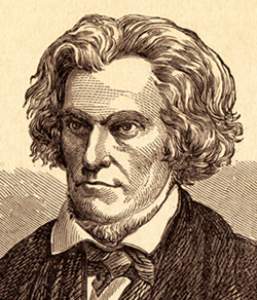John Caldwell Calhoun (Congressional Biographical Directory)
Reference
CALHOUN, John Caldwell, (cousin of John Ewing Colhoun and Joseph Calhoun), a Representative and a Senator from South Carolina and a Vice President of the United States; born near Calhoun Mills, Abbeville District (now Mount Carmel, McCormick County), S.C., March 18, 1782; attended the common schools and private academies; graduated from Yale College in 1804; studied law, admitted to the bar in 1807, and commenced practice in Abbeville, S.C.; also engaged in agricultural pursuits; member, State house of representatives 1808-1809; elected as a Democratic Republican to the Twelfth and to the three succeeding Congresses and served from March 4, 1811, to November 3, 1817, when he resigned; Secretary of War in the Cabinet of President James Monroe 1817-1825; elected vice president of the United States in 1824 with President John Quincy Adams; reelected in 1828 with President Andrew Jackson and served from March 4, 1825, to December 28, 1832, when he resigned, having been elected as a Democratic Republican (later Nullifier) to the United States Senate on December 12, 1832, to fill the vacancy caused by the resignation of Robert Y. Hayne; reelected in 1834 and 1840 and served from December 29, 1832, until his resignation, effective March 3, 1843; Secretary of State in the Cabinet of President John Tyler 1844-1845; again elected to the United States Senate, as a Democrat, to fill the vacancy caused by the resignation of Daniel E. Huger; reelected in 1846 and served from November 26, 1845, until his death in Washington, D.C., March 31, 1850; chairman, Committee on Finance (Twenty-ninth Congress); interment in St. Philip’s Churchyard, Charleston, S.C.
"Calhoun, John Caldwell," Biographical Directory of the United States Congress, 1774 to Present, http://bioguide.congress.gov/scripts/biodisplay.pl?index=C000044.
John C. Calhoun (Ford, 1988)
Scholarship
Calhoun, of course, was an astute politician. He did not expect unanimity in South Carolina on any issue, except perhaps opposition to the abolitionists, and…he certainly did not shy away from political competition once a challenge emerged. Yet Calhoun’s preference for the “country-republican” consensus ideal always influenced his attitude toward South Carolina politics. He always fought for victory, the sought reconciliation. He never looked only to reward the faithful but also to bring the opposition back into the fold. He never wanted merely to dominate South Carolina politics but rather to unite the state behind his actions. Although Calhoun seldom, if ever, succeeded in actually uniting the whole state behind him, he did frequently have the overwhelming majority of South Carolinians on his side, and he made the unusual cohesion within South Carolina work to give the state a loud and strong voice in national forums. The purpose of the consensus preached by Calhoun, and usually practiced by his followers, was to achieve for South Carolina as a whole a sort of political independence that was essentially the personal independence of the republican freeholder writ large. South Carolina could then, like Calhoun, stand on its “own bottom,” beyond the sway of demagogues and above the corrupting influence of spoilsmen. Throughout his life, Calhoun and his followers kept South Carolina half-in and half-out of the Jacksonian mainstream, waging a series of heated grassroots campaigns, literally going field-to-field and door-to-door wooing voters, but always, even when acting as a tough partisan, standing as a barrier to the development of a permanent two-party system in South Carolina.
Lacy K. Ford, Jr., Origins of Southern Radicalism: The South Carolina Upcountry, 1800-1860 (New York: Oxford University Press, 1988), 191-192.
John C. Calhoun (Garraty, 1994)
Textbook
Calhoun, old and ill, his once-powerful voice broken by the throat cancer that would soon kill him, sat grim and silent as another senator read his words: "How can the Union be saved? There is but one way by which it can with any certainty; and that is, by a full and final settlement, on the principle of justice, of all the questions at issue between the two sections [North and South]. The South asks for justice, simple justice, and less she ought not to take. She has no compromise to offer but the Constitution; and no concession or surrender to make. She has already surrendered so much she has little left to surrender. Such a settlement would go to the root of evil, and remove all cause of discontent, by satisfying the South she could remain honorably and safely in the Union and restore the harmony and fraternal feelings between the sections which existed anterior to [before] the Missouri agitation [compromise in 1820]. Nothing else can with any certainty, finally and forever settle the question, terminate the agitation, and save the Union. But can this be done? Yes easily; not by the weaker party [the South] for it can of itself do nothing not even protect itself but by the stronger"… Unless Congress allowed owners to bring their slaves into the territories, the Southern states would secede, or leave the Union. There was nothing evil or immoral about slavery, Calhoun argued. Northerners must accept the fact that it exists. If they want to live at peace with the South, they must stop criticizing slavery.
John A. Garraty, The Story of America (Austin: Holt, Rinehart, and Winston, 1994), 440-441.




